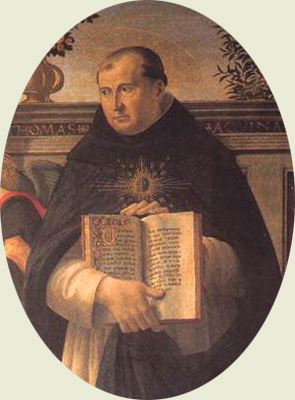
INTELLIGENCE AND WILL IN THOMAS AQUINAS
Central Building, Aula Magna
Pamplona, 26-27 April 2018
| PHILOSOPHICAL MEETINGS 2018 |  |
|---|---|
| INTERNATIONAL CONGRESS INTELLIGENCE AND WILL IN THOMAS AQUINAS | |
| University of Navarra Central Building, Aula Magna Pamplona, 26-27 April 2018 | |
Intelligence and will play a key role in the thought of Thomas Aquinas. They are the most specific faculties in a person, and therefore modulate the best of the person's life, work and aim. They allow us to learn the truth and to love what is good. It's plenitude is also the maximum perfection of the act of being, for «to live is to be for the living» and «the act of the intellect is life». Divine intelligence and will are the origin of everything created and, therefore, truth and good are transcendentals, for all reality is commensurated with its provenance. For this reason, intelligence and will are in the nucleus of the history of philosophy, and Aquinas's contributions in Metaphysics, Ethics, Anthropology or Theory of Knowledge are closely linked to his thoughts on intelligence and will.
This aspect of Thomistic philosophy can be seen, on the one hand, in the most specific of Thomas's teaching. The analogy of the actus essendi and the diversity of categories are originated, for Thomas Aquinas, in God's own intelligence and will capacities. Besides, the character and richness of knowledge and moral life, as they are developed in Thomistic thought, lie also in intelligence and will. And the harmony between nature and liberty, between natural and supernatural order, between philosophy and theology, is possible thanks to the specifics of both faculties.
On the other hand, the importance of intelligence and will in Aquinas's doctrine arises too from the relevance both hold in the history of thought and, therefore, in the main controversies that Thomas had to face in his time, like the unicity of intellect and the immortality of the individual; the relation between philosophy and theology; or the character of moral perfection. Hence, historical perspective also helps understand Thomas Aquinas's contributions to our understanding of intelligence and of will.
The Department of Philosophy of the University of Navarra and Fundación Tomás de Aquino, organising bodies of these LIV Philosophical Meetings, invite Thomist scholars to present and debate their own contributions in this field.
Direction:
Director: Prof. Dr. Enrique Alarcón (Universidad de Navarra)
Assistant Director: Prof. Dr. Piotr Roszak (Uniwersytet Mikołaja Kopernika, Toruń)
Secretary: Prof. Dr. M. Idoya Zorroza (Universidad Pontificia de Salamanca)
Secretariat:
Ms. Raquel Goñi
Secretary of the School of Humanities and Social Sciences
University of Navarra
Campus Universitario S/N
E-31009 Pamplona
Spain
Email address: rgoni@unav.es
Phone number: (+34) 948425600 Extension: 802404
Organizing Bodies:
University of Navarra
Fundación Tomás de Aquino
Cooperating Entities:
Société Internationale pour l'Étude de la Philosophie Médiévale (SIEPM)
Society for Medieval and Renaissance Philosophy (SMRP)
Society for Medieval Logic and Metaphysics (SMLM)
Sociedad de Filosofía Medieval (SOFIME)
Thomas Aquinas International Society (SITA)
Instituto Santo Tomás (Fundación Balmesiana, Barcelona)
Instytut Tomistyczny (Warsaw)
Red Latinoamericana de Filosofía Medieval (RLFM)
International Council of Universities in the Spirit of St. Thomas Aquinas (ICUSTA)
Thursday, April 26
8:20- 9:00 (Aula Magna entrance hall, ground floor): Conference registration & information desk open
9:00- 9:10 (Aula Magna): Opening session
9:10-10:10 (Aula Magna): Henk J.M. Schoot (Thomas Institute of Utrecht, Tilburg University): Intelligence and Will: Thomas Aquinas on Human Beings as Image of God
10:10-11:10 (Aula Magna): Marco Passarotti (CIRCSE Research Centre, Università Cattolica del Sacro Cuore, Milan): Using a Treebank for Interviewing Thomas Aquinas on Intellect and Will
11:10-11:30 (Aula Magna entrance hall): Coffee break
11:30-12:30 (Aula Magna): Enrique Martínez (Universitat Abat Oliba CEU, Barcelona): Rooting of Intelligence and Will in Memory according to Aquinas
12:40-14:00 (Aula Magna, Classroom 30, Classroom 32, Classroom 33): Parallel contributed sessions
14:00-15:30: Lunch break
15:30-17:00 (Aula Magna, Classroom 30, Classroom 32, Seminar Room 2370): Parallel contributed sessions
17:15-18:15 (Aula Magna): Piotr Roszak (Nicolaus Copernicus University, Toruń): Regarding esse in propria natura: Truth in Beings and in the Divine Creative Intelligence
18.15-18:45 (Aula Magna entrance hall): Coffee break
18:45-19:45 (Aula Magna): Idoya Zorroza (Pontificia Universidad de Salamanca): Human Domain and Use of the Will according to Thomas Aquinas
20:00-20:30 (Aula Magna): Official presentation of the commemorative book Opere et veritate: Tribute to Professor Ángel Luis González
Friday, April 27
9:00-10:00 (Aula Magna): Mark Johnson (Marquette University): What Does the Intellect Do to the Will?
10:00-11:00 (Aula Magna): Michael Sherwin OP (Université de Fribourg): Knowledge and Love: The Dance of Practical Wisdom
11:00-11:30 (Aula Magna entrance hall): Coffee Break
11:30-12:30 (Aula Magna): Enrique Alarcón (Universidad de Navarra): The Founding Radicality of Intelligence and Will in Aquinas's Metaphysics of esse
12:40-14:00 (Aula Magna, Classroom 30, Classroom 31, Classroom 33): Parallel contributed sessions
14:00-15:30: Lunch break
15:30-17:00 (Aula Magna, Classroom 30, Classroom 31, Classroom 33): Parallel contributed sessions
17:10-18:10 (Aula Magna): Francisco León Florido (Universidad Complutense de Madrid): Transcendental Relation (habitudo) in the Intellection Act according to Aquinas
18.10-18:30 (Aula Magna entrance hall): Coffee break
18:30-19:30 (Aula Magna): Agustín Echavarría (Universidad de Navarra): Does God Have a Plan B? Effectiveness of the Divine Will and Contingency of the Second Causes according to Thomas Aquinas
19:30-19:45 (Aula Magna): Closing of the conference
Thursday, April 26, 12:40-14:00, Aula Magna (Central Building, ground floor) Abstracts
Chair: Piotr Roszak
Thursday, April 26, 12:40-14:00, Classroom 30 (Central Building, last floor) Abstracts
Chair: Michał Mrozek
Thursday, April 26, 12:40-14:00, Classroom 32 (Central Building, last floor) Abstracts
Chair: Idoya Zorroza
Thursday, April 26, 12:40-14:00, Classroom 33 (Central Building, last floor) Abstracts
Chair: Enrique Martínez
Thursday, April 26, 15:30-17:00, Aula Magna (Central Building, ground floor) Abstracts
Chair: Piotr Roszak
Thursday, April 26, 15:30-17:00, Classroom 30 (Central Building, last floor) Abstracts
Chair: Mercedes Rubio
Thursday, April 26, 15:30-17:00, Classroom 32 (Central Building, last floor) Abstracts
Chair: Enrique Martínez
Thursday, April 26, 15:30-17:00, Seminar Room 2370 (Central Building, last floor) Abstracts
Chair: Idoya Zorroza
Friday, April 27, 12:40-14:00, Aula Magna (Central Building, ground floor) Abstracts
Chair: Agustín Echavarría
Friday, April 27, 12:40-14:00, Classroom 30 (Central Building, last floor) Abstracts
Chair: Enrique Martínez
Friday, April 27, 12:40-14:00, Classroom 31 (Central Building, last floor) Abstracts
Chair: Idoya Zorroza
Friday, April 27, 12:40-14:00, Classroom 33 (Central Building, last floor) Abstracts
Chair: José Ignacio Murillo
Friday, April 27, 15:30-17:00, Aula Magna (Central Building, ground floor) Abstracts
Chair: Agustín Echavarría
Friday, April 27, 15:30-17:00, Classroom 30 (Central Building, last floor) Abstracts
Chair: Juan Carlos Inostroza
Friday, April 27, 15:30-17:00, Classroom 31 (Central Building, last floor) Abstracts
Chair: José Ángel Lombo
Friday, April 27, 15:30-17:00, Classroom 33 (Central Building, last floor) Abstracts
Chair: Albert von Thurn und Taxis
Researchers interested in the topics dealt with in the congress are invited to present paper proposals, including title and a 250 words summary. The proposal must be sent as an attachment in an email to the conference director, Prof. Enrique Alarcón < ealarcon@unav.es > before March 1. Only after the acceptance of the communication should the corresponding inscription be formalised.
The presentation of the communication, in person or telematic, should not exceed 20 minutes.
In order to do a telematic presentation of an accepted communication, it's author should record a video in digital format and send it before April 1 to the secretariat of the congress, following the instructions that will be given after registering the corresponding form ( modality 2, explained as follows).
Congress registration modalities are:
Telematic participation allows for the online watching of the recorded presentations and communications, as well as of telematic presentations. The latter will be recorded by their authors and sent to the congress secretariat. Further instructions will be given to registered participants.
Registration for all members of the University of Navarra (both staff and students) will be free until March 15. After that there will be a 50% discount. This will also be applicable to members of Fundación Tomás de Aquino and to collaborators of the Corpus Thomisticum Project.
A 50% discount will also be applicable to:
Those students of the University of Navarra who wish to convalidate 1 ECTS credit for their assistance to the Philosophical Meetings have to register as such and pay the corresponding university fees. They will send an essay on any of the topics debated in the presentations, with a minimum of 1.500 words, to the director of the Conference, Prof. Enrique Alarcón < ealarcon@unav.es > before May 5. Students of Year 4 of the Degree in Philosophy at the University of Navarra who present a communication could get a further 1 ECTS credit. They will register as such and pay only the corresponding university fees.
| Name | Passport/ID | |||||
| Center | Position | |||||
| Postal address | City | |||||
| Country | Postcode | |||||
| Phone number | Email address | |||||
Registration modality:
In-person participation including paper presentation (40 €)
Telematic participation including paper presentation (50 €)
In-person participation without paper presentation (50 €)
Telematic presentation without paper presentation (30 €)
Discounts:
Lecturers, employees and students of the University of Navarra. No registration fees until March 15.
Members of Fundación Tomás de Aquino or collaborators of the Corpus Thomisticum Project. No registration fees until March 15.
Members of Alumni Navarrenses / Association of Friends of the University of Navarra (50%).
Member of cooperating entity (50%). Please specify:
Unemployed Graduate (50%).
Fees must be met before April 10 either by direct payment or bank transfer to our account:
A copy of the transfer's receipt must be sent to Ms. Raquel Goni < rgoni@unav.es >, with the heading: «Philosophical Meetings 2018».
N.B.: Registration data may be incorporated and treated in a file for internal use and complementary services, such as information and publications related to the organising bodies. The participant is informed and allows these bodies to send data specifically to entities that participate in its activities. You may exercise your right to access, rectify, cancel and oppose these data under Spanish Organic Law 15/1999, by sending an email to secretariaffyl@unav.es
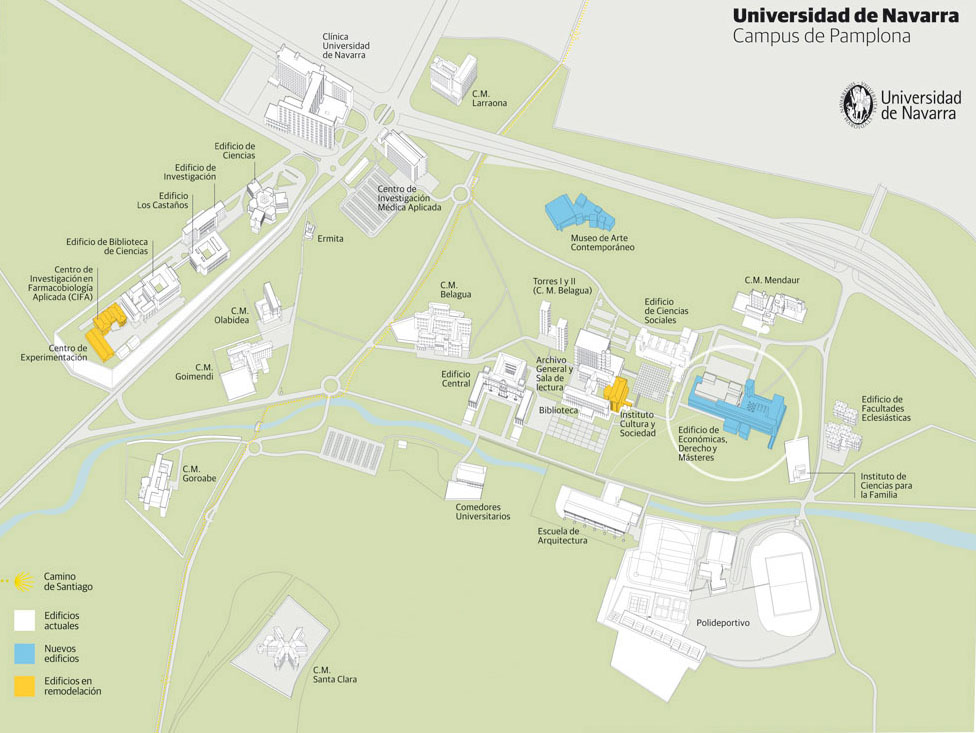 |
|---|
Map of the University of Navarra campus in Pamplona |
Main sessions will take place in Aula Magna of the Central Building (Central Building) of the University of Navarra [coordinates: 42.801336, -1.660085].
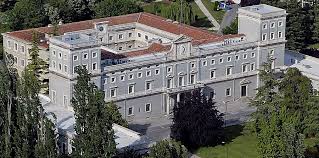 |
|---|
You can have breakfast or lunch at any of the Cafés on campus. Beside this, opposite the Central Building you can find the Comedores Universitarios (University Canteens) [coordinates: 42.800191, -1.660937], also with varied menus at good prices:
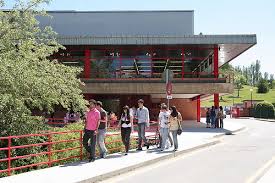 |
|---|
The biggest public car park at the University is only 600m from Central Building, situated opposite the Sports Centre ( Polideportivo) [coordinates: 42.798738, -1.653287].
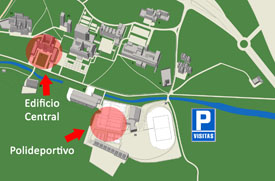 |
|---|
You may want to book accommodation through one of many dedicated webpages, as, for instance:
Alternatively, «Viajes El Corte Inglés» can help you with accommodation, counting with some good offers for participants in activities at the University of Navarre. Please contact:
Vanessa Pardo - Outplan group University of Navarra
Travel agents
Viajes El Corte Inglés
Paseo Anelier, 30-31
E-31014 Pamplona
Spain
Email address: pamplonarochapea@viajeseci.es
Phone number: (+34) 948383588
 |
 |
| |
|
|
|
|
|
|
|
|